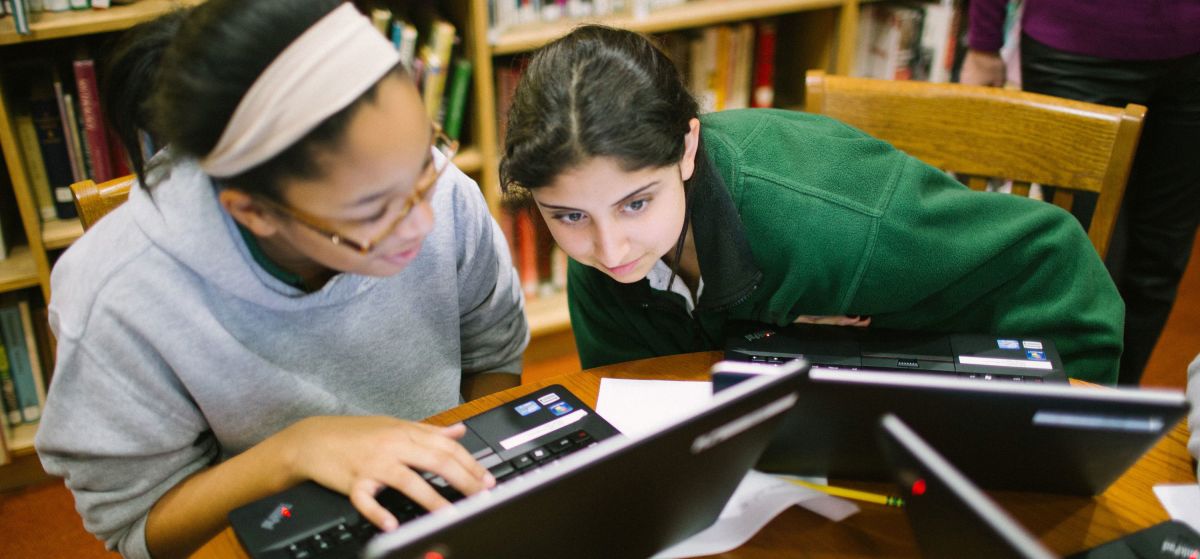
Teaching Digital Citizenship
This article originally appeared on RemakeLearning.org, one of Kidsburgh’s community partners. Remake Learning reports on the people, organizations and ideas shaping the future of teaching and learning in the greater Pittsburgh region.
The internet: It’s filled with video-based Algebra tutorials, games for language learners, and university-generated advice on how to succeed in college. But it can also be a very dark place, fraught with trolls, misinformation, and temptations to overshare.
The internet can be an especially risky place for kids and teens, who are prone to making impulsive decisions because of their age. “Adolescents are more oriented to the present, so they are less likely than adults to be thinking about the future consequences of what they’re saying,” Laurence Steinberg, psychology professor at Temple University, told the New York Times in an article on teens and the criminal justice system.
It doesn’t help that the internet allows people to do things instantaneously and often anonymously. Case in point: “Why Kids Sext,” an illuminating piece by the Atlantic’s Hanna Rosin. “Surveys on sexting have found pretty consistently that among kids in their upper teens, about a third have sexted,” she wrote. Sending a nude picture to a boyfriend might seem harmless in the moment, but that picture could easily end up somewhere far more public.
What happens on the internet tends to stick around for a while—and that’s a lot to handle for people who’ve spent fewer than two decades on Earth. The implications extend to everything—from finding credible information, to understanding digital copyright, to forging relationships with peers.
In late October, the national nonprofit Common Sense Media led the second annual Digital Citizenship Week to raise awareness about these thorny issues. The goal was to get students to pause, step away from their screens, and think critically about their engagement with the digital world. The week is part of Connected Educator Month, which encourages educators to make full use of online spaces.
As the stories above illustrate, though, digital citizenship is too complex and too important for only a week in the spotlight. Common Sense Media’s K−12 digital literacy and citizenship curriculum has downloadable lesson materials and resources for engaging families and caregivers. Jennifer Ehehalt, Pittsburgh regional manager for Common Sense Media, is working with Pittsburgh schools to make full use of these resources. One example for middle school students: “Scams and Schemes,” a lesson that addresses identity theft and ways to prevent it.
Along with the curriculum, Common Sense Media has a wealth of other resources on digital citizenship. Digital Passport, a suite of interactive and collaborative games, teaches third- through fifth-grade users the fundamentals of digital literacy. Digital Glossary translates internet slang, covering classics like “selfie” along with newer terms like “sub-tweeting” (the Twitter equivalent of talking about someone behind his or her back). There’s even an animated video—complete with rapping—on the dangers of oversharing.
The Common Sense Media blog reported that in Grand Island, Nebraska, elementary school classes came up with digital citizenship slogans and used them to decorate their doors and walls. If you believe ten-year-olds don’t need to consider that kind of stuff, think again: A 2011 self-report survey of nearly 21,000 Massachusetts students found that 39 percent of fifth-graders own cell phones. On the other side of the country, many Los Angeles Unified School District teachers pledged to teach five lessons on digital citizenship in the course of the week. The lessons covered subjects like privacy, password creation, and digital footprints.
In the Pittsburgh area, schools have begun addressing digital citizenship year-round with their own curricula. Earlier this year, Mars Area Middle School in Butler County launched a series of 21st-century digital citizenship courses. They zero-in on three main topics: safety, cyberbullying, and social networking.
“You get wrapped up in the conversation and, next thing you know, you say something you shouldn’t have,” Patrick Scott, one of the school’s computer teachers, told the Pittsburgh Post-Gazette. “It’s hard in email for the recipient to realize you are joking or sarcastic.”
Both teachers and caregivers can also show younger kids episodes of “Ruff Ruffman: Humble Media Genius,” PBS KIDS’ new animated broadband series on media and technology. The title character, a bespectacled dog, guides viewers through topics like web search and photo sharing in a relatable, entertaining way.
We’re not losing our digital citizenship anytime soon. That means we’ll continue to have unfathomable amounts of information at our fingertips. It also means we need to keep thinking about how to use that citizenship wisely.